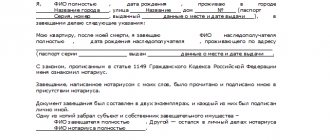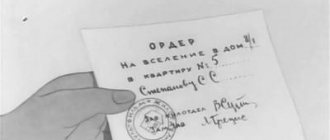5,00
5
| Reviews: | 1 | Views: | 4949 |
| Votes: | 1 | Updated: | n/a |
File type Text document
Document type: Application
?
Ask a question Remember: Contract-Yurist.Ru - there are a bunch of sample documents here
APPLICATION FOR CANCELLATION OF WILL To the First Moscow State Notary Office from gr. Ivanov Sergei Ivanovich, residing: Moscow, st. Chekhova, 10, apt. 7. STATEMENT Certified on February 7, 1978 according to register 2d-385 in your notary office on my behalf, I hereby cancel the will. City of Moscow, July seventeenth thousand. nine hundred and ninety-one. Signature Certification inscription of the state notary office Note. The testator has the right at any time to change or cancel the will he made by drawing up a new will or by submitting an application for cancellation of the will to the notary office that certified the will. The authenticity of the signature on the application to cancel the will must be certified in a notary office or the executive committee of the relevant Council of People's Deputies.
Download the document “Sample. Application to cancel a will"
Is it possible to cancel a will on an apartment?
The possibility of canceling the act of expression of will follows from the provisions of Art. 1119 of the Civil Code of the Russian Federation, which reinforces the freedom of capable citizens to draw up, cancel and change property orders that will come into force after his death. At the same time, he will not be obliged to coordinate or even inform the persons indicated in the will about his decision. However, the powers of the testator also have some restrictions.
The testator cannot cancel or reduce the obligatory share of the inheritance due to his disabled parents, spouse and children, as well as dependents who have been in his support for at least a year (Article 1149 of the Civil Code).
These persons will receive the share of property required by law, reduced by half. But they can be deprived of it by the court in favor of the heir appointed in the will if he was using the object of inheritance at the time of the death of the legal owner. For example, the inheritance (apartment) left after the death of parents can become the full property of their daughter, who lived in it and had no other housing. While the testator’s own disabled sister, to whom he sent regular money transfers for three years, may lose the right to 1/4 of the apartment if she has her own living space.
Is it possible to challenge a will after entering into an inheritance?
In accordance with Article 1154 of the Civil Code of the Russian Federation, heirs are given 6 months to enter into property rights. It is during this period that the will is read out, documents are collected and legal proceedings are initiated if one of the applicants is not satisfied with their part of the inheritance or is not satisfied with the meaning of the will. Moreover, the notary has the right to suspend the issuance of inheritance certificates until a court decision is made, thus increasing the period for resolving the situation from several months to a year.
But sometimes relatives learn about the death of a family member and, accordingly, the already completed division of the inheritance or the transfer of property to other persons more than 6 months later. Under such circumstances, the will can still be challenged, but taking into account the provisions of Article 181 of the Civil Code of the Russian Federation, which determines the application of the deadlines for claims in certain situations.
Thus, within the framework of Part 1 of Article 181 of the Civil Code of the Russian Federation, a will can be declared void within 3 years from the date of opening the inheritance case and the death of the testator. If a potential heir plans to challenge a testamentary disposition by virtue of Part 2 of Article 181 of the Civil Code of the Russian Federation, the period for going to court is only a year, but from the moment he learned that his rights were violated.
What is better, a gift deed or a will?
Reasons for revoking a will
The reasons for canceling or changing the act of expression of will can be different - their objectivity and significance are determined solely by the testator. Moreover, the testator has the right to keep secret from others the circumstances that prompted him to revoke his notarized orders.
A will is revoked by a notary on the basis of an application by its author to cancel individual orders, the document as a whole, or the drawing up of a new act that fully or partially contradicts the previous one.
Example . In the first will, the testator left his apartment to his daughter, but a few years after that she died. After this, her father came to the notary in order to revoke the document. To do this, he drew up a new will, in which he indicated his granddaughter instead of his deceased daughter.
Example . After drawing up the expression of will, the citizen changed his mind about one of the persons appointed by him and wished to exclude him from the list of successors. To do this, he submitted an application to the notary to cancel all orders concerning the unworthy, in his opinion, heir.
Is it possible to revoke a will for inheritance during the life of the testator?
Only the testator himself can cancel or change the order. Moreover, he does not have to explain to the notary the reasons for his action.
It is enough to contact a notary office (Article 1130 of the Civil Code of the Russian Federation) and:
- make an order to revoke the will;
- create a new document.
Expert opinion
Stanislav Evseev
Lawyer. Experience 12 years. Specialization: civil, family, inheritance law.
The consent of the beneficiaries is also not required for the execution of an order. So is its cancellation. A will is a one-sided transaction. Therefore, the direct expression of the will of the testator is sufficient.
But, if the new order does not contain any mention of the complete or partial cancellation of the previous document, then it completely cancels the part that contradicts the new edition.
How to cancel a will for an apartment can be found in the article: “How to cancel, annul a will for an apartment.”
The order of inheritance under a will in case of cancellation or modification of a document:
- If the latest version of the will is declared invalid in court, then the acceptance of the inheritance is carried out on the basis of the previous order.
- If the testator changes his mind about bequeathing his property, he can make an order to cancel the previously drawn up document. As a result, inheritance of a citizen’s property will occur within the framework of the law.
Cancellation time and place
The testator has the right to cancel notarized orders at any time, up to his death, provided he has full legal capacity. In some cases, a certificate confirming this circumstance may even be required.
The place where a will is revoked is not regulated by law, nor is the place where it was drawn up. They may not even coincide - data on notarial actions in relation to all expressions of the citizen’s will are recorded in the Unified Information System, which eliminates the possibility of misunderstandings.
But the testator should also remember about the convenience of his successors, who will have to look for the will and redirect it to the notary working at the place of last registration of the deceased to open an inheritance case.
How to cancel and change a will for an apartment
The procedure for canceling posthumous orders is regulated by Art. 1130 Civil Code of the Russian Federation. It is carried out in the presence of a notary, necessarily in the presence of a passport identifying the testator - the authorized person is obliged to make sure that the amendments to the will are made by its maker. It is also recommended that the future testator have a medical certificate confirming his full legal capacity (especially important for citizens over 75 years of age).
Otherwise, the annulment of an act of unilateral will can be done in different ways and depends on the intentions of the applicant and the type of document he has drawn up.
Fully
If a citizen is fundamentally dissatisfied with his will and wants to completely review its contents, then he can do this in two ways:
- Writing an application to cancel a document.
- Drawing up a new act that contradicts the content of the previous one.
In the first case, the testator revokes the previous orders using a special statement drawn up in the form of a will, that is:
- Transferred to paper, taking into account the strict sequence of presentation of information, which should reflect not only the will of the citizen, but also his personal data, as well as the name and address of the notary.
- Certified by authorized persons - a notary or the head (director, captain, chief or duty doctor) of the institution, expedition where the testator resides and, due to the remoteness of his residence, cannot contact the notary.
- Signed by the will-maker and containing the date of completion.
In the second case, the potential testator simply draws up a new document with the instructions already changed. The old ones lose their power automatically.
It is worth keeping in mind that if the last will is declared invalid, the previous act of expression of will again acquires legal significance. An application for cancellation, executed with significant violations, also entails the preservation of the legal force of the will. But this rule does not apply to a document, the contents of which were canceled by a later canceled act (the citizen drew up one act, then another, contradicting the first, and after all this, canceled the second with a separate statement).
Example . The testator executed a deed with his posthumous dispositions and designated his illegitimate daughter as the sole heir. Then he changed his mind and bequeathed all the property to his nephew. And after that he revoked his last will. As a result, the first document remained legal, according to which his daughter would be his successor.
Example . The testator bequeathed the apartment to his two children in equal shares. After that, he ended up in a nursing home and, shortly before his death, made a new act of expression of will, in which the doctor on duty at the institution was appointed heir, who certified his last property dispositions. After the death of the testator, his children challenged the last act due to the inadmissibility of appointing a person executing the will as a successor. The first document eventually acquired legal force.
Separate orders
A citizen has the opportunity to leave the completed will valid, only partially adjusting its contents. This can also be done in two ways:
- Simple cancellation of individual orders - cancellation of the right of residence in the apartment of the appointed person in the manner of a testamentary refusal or cancellation of a testamentary assignment (while the right of inheritance for the specified successor is retained).
- By replacing individual clauses of the act with contradictory ones, when, for example, the same legacy is planned to be assigned to another recipient.
All adjustments are made by creating a separate document - making changes to an already drawn up act is prohibited.
In emergency situations
Orders left by a citizen in emergency circumstances can be written in a simple form (Article 1129 of the Civil Code of the Russian Federation). But their effect is not equivalent to those notarized and does not cancel them. In this way, you can only cancel or change a will made in a similar way.
But it is important to remember that any expression of will made under exceptional circumstances will be canceled a month after the situation is resolved, provided that the testator remains alive.
Procedure
If we summarize the procedures for canceling and changing the legal force of a will, we can identify the following algorithm of actions for the testator:
- A visit to a notary (preferably the one who certified the document being annulled).
- Writing an application for cancellation/change or certification of new orders.
- Payment of state duty.
Procedure
The testator has the right to contact any notary who exercises his powers on the basis of a valid license, but it is better if it is a specialist or an office that stores the first copy of the deed. This is explained by the need to perform additional actions if the testator decides to choose another authorized person to visit.
Despite the existence of the Unified Notary Information System, into which all data on completed or canceled notarial acts is entered, an application for cancellation or a new will submitted to another notary must be duplicated and sent by registered mail to the document being canceled.
You can find out the list of nearest notaries, their addresses and telephone numbers on the website of the Federal Notary Chamber using the “Find a Notary” electronic service. The first name, last name, and patronymic of the wanted specialist are entered into the search strings. You can also use the advanced search and select a notary based on territoriality and the availability of an accessible environment for citizens with disabilities.
An application for cancellation/change or a new will is essentially drawn up in the same way - to do this, the testator needs to verify his identity, certify the document with his personal signature in the presence of a notary and hand it over to an authorized person for certification. But at the same time, it is necessary to remember that the application and will are contestable and approach their execution with great responsibility.
The following actions will help strengthen the legal force of the act being performed:
- Providing the notary with a medical certificate confirming your full legal capacity.
- Calling witnesses* who will sign the application (will), further certifying the legality of what is happening.
- Compliance with the rules and forms of document preparation.
* - the following cannot be chosen as witnesses:
- notary;
- heirs, legatees, their relatives (parents, children, spouses);
- illiterate;
- those who do not speak the language of writing a will;
- incompetent;
- in an altered state of consciousness.
Cancellation of a will made under emergency circumstances
Some people have unforeseen situations that may prompt them to write a will in urgent circumstances - natural disasters, military operations, cataclysms.
There is not always a notary nearby; he may not be available in the area at all. The law (Article 1129 of the Civil Code of the Russian Federation) then allows a person to express his will in writing without notarization, but in the presence of two witnesses, and always with his signature with a transcript.
However, a month after the unforeseen circumstances disappear, this document loses its force, that is, it will be canceled automatically if the person remains alive. Therefore, if a citizen wants to leave his will in force, he must register his will within 30 days.
If you want to cancel it, just don’t do it, it will cease to operate on its own, and then create a new one. Another reason for its termination is the absence of a signature and two witnesses when writing it.
Often people make closed wills. It is drawn up by the citizen in his own hand in the presence of two witnesses.
Then they are handed over in an envelope to a notary, on which the signatures of the persons present during this procedure are affixed. The text of the will is known only to the testator (Article 1126 of the Civil Code of the Russian Federation). It can be opened within 15 days after his death, by the notary with whom it is kept.
The cancellation procedure is identical to that with an open option. A citizen can come to a notary’s office at any time and draw up a new document.
Application for cancellation
The application for revocation, just like a will, does not have a strict form of presentation. There are certain nuances that are recommended to be taken into account when drawing up a declaration of will, and several rules regarding the execution of the document.
Form and content
First of all, you should note the design rules:
- Presentation is allowed on paper, by hand or using writing tools.
- The application must be signed by the testator, signed by him in the presence of a notary and, if desired, witnesses.
- An integral point in the content of the application is the date of filing, the full name of the notary who certified the revoked will, and the registration number of the act of expression of will.
Otherwise, the preparation of the application depends on the goals of the testator. If he plans to cancel individual orders, he needs to indicate this as specifically and unambiguously as possible so that the heirs do not subsequently have disputes and misunderstandings on this basis. It’s easier to cancel the entire will - all you need to do is write the number and place of the posthumous expression of will and declare it cancelled.
Sample application for cancellation of a will for an apartment 2021
The following statement can be considered as an example
Documentation
When making and revoking a will, the testator is required to submit a similar package of papers, which consists of only two documents - an identity card and a receipt for payment of state fees.
There is an opinion that the notary must present title documents for the apartment, a certificate of legal capacity, etc. But in fact, it is not entirely legal to demand them from the testator. This can be argued as follows:
- The law does not prohibit bequeathing property that did not belong to the testator at the time of certification of posthumous dispositions (the main thing is that the apartment should be registered by the day the inheritance is opened).
- The regulatory legal acts of the Russian Federation do not indicate that the testator is obliged to provide a certificate of sanity, and the notary has the right to demand it (Article 43 of the “Fundamentals of the Legislation of the Russian Federation on Notaries” states that the notary is obliged to check the legal capacity of persons who apply to him, but the method of this verification is not installs). However, you should not refuse to submit documentary evidence of your own legal capacity - this certificate will only strengthen the legal force of the application and strengthen the legal position of the testator.
Suitable identification documents:
- passport of a citizen of the Russian Federation or another state;
- passport of a military man, sailor;
- military ID;
- resident card;
- temporary residence permit, etc.
What are the components of the cost of a will with a notary?
First of all, this is a legally established state duty.
The total cost that you will need to pay for the document will include such components as:
- state duty determined by the Tax Code of the Russian Federation;
- the cost of technical and legal work of a notary;
- the cost of additional services that may be required.
Also, some related services of notary representation may be included in the total amount. They will be required during the execution of the testamentary disposition. The tariff for technical and legal work of a notary is not fixed by law, and each notary office sets prices for its services at its own discretion. In each region, the cost of issuing a testamentary disposition certificate and notary services varies. This has a greater impact on the final amount.
Also, prices for the services of additional assistants, such as a translator, executor and executor, which may be required by the preparer in some cases, also differ regionally. The total amount does not depend on the selected type of document compiled - open or closed.
State duty and associated costs for registration of a will
In order to determine how much a will for an apartment costs from a notary in 2021, it is necessary to take into account several circumstances. These include: the district in which the document is drawn up, the prices of a separate notary chamber, a number of additional options that may be required.
For example, in the city of Moscow, the estimated cost of drawing up an order with a notary will be 900 rubles: 100 state fees for mandatory notarization and 800 rubles for notary services. On the territory of the Russian Federation, at the maximum, this amount, as a rule, does not exceed 3,000 rubles.
The amount of state duty is the same for the entire Russian Federation and is indicated in the Tax Code. In 2021, the Tax Code of the Russian Federation determines the state duty for a will in the amount of 100 rubles.
Notary offices do not have the right to revise, change or increase it. Otherwise, they risk incurring administrative liability for this. The remaining components of the total amount will vary depending on the region where the testamentary order was drawn up and on the prices set by a particular notary office for its services. They must be clarified directly from the notary.
Notary office services at the disposal of the testator
The cost of a will for an apartment from a notary in 2021, as well as for a share in it or for a house, can be found out exactly only by being directly in the selected notary office. The total cost of drawing up a testamentary certificate consists of the services of a notary and notarization of the document.
The cost of notarization is determined by law by the Tax Code of the Russian Federation. But for other services, if a will is drawn up, the price from a notary in 2021 can be set by the chamber independently. In Russia, the fee for them usually varies within 1000 rubles per document page . Accordingly, if the document contains more pages, the price will increase proportionally.
Notary services may include:
- checking the text of the will for spelling errors and contradictions;
- proof of identity and legal capacity of the testator;
- taking measures to exclude any methods of influence on the author of the document;
- provision of painting and printing;
- entering information about the will into the register.
Afterwards, the notary carries out a full check of the entire text for errors, an explanation of all the rights and obligations of the testator and his appointed heirs. If every aspect of the document is completely satisfactory to the testator, the document is signed.
How much does it cost to revoke a will?
The notary collects a fee from the testator for certifying orders in the amount established by Art. 333.24 of the Tax Code of the Russian Federation - 100 rubles for each action to cancel or change a notarized act.
In addition to the state fee, the testator will have to pay for legal and technical services provided by the notary. The tariff depends on the method of annulment of the will and on the region in which notarial actions are carried out. Below are the prices for Moscow:
- cancellation or change of will by submitting an appropriate order - 500 rubles;
- cancellation or modification by drawing up a new will, completely or partially contradicting the old one - 1900 rubles.
Consequences
The consequences of revocation of a will may be:
- A change in the inheritance order, as a result of which the heirs by law will be called upon to receive the apartment.
- Loss of the ability of some heirs under a will to claim living space or to receive a testamentary refusal at its expense.
- Transfer of ownership to a new designated successor.
- Exclusion from the will of sub-designated claimants.
Is a gift agreement a substitute for a will?
The two legal relationships are partially similar. These are unilateral transactions, according to which the donee and the heir receive the immovable (movable) property of the testator or donor free of charge.
However, they have significant differences, namely:
- A deed of gift for an apartment involves the transfer of ownership within 5 days after registration of the transaction with the Rosreestr authorities. Whereas, according to the will, this will happen only six months after the death of its owner (that is, it is still unknown when and in what form and condition).
- The heir uses the property only after the death of the testator, while the donee uses it much more quickly.
- The testator can repeatedly change his will, while with a deed of gift everything is much more complicated.
It is possible to draw up a deed of gift and transfer specific property during your lifetime. The gift agreement does not terminate the validity of the will, but part of the property passes to the new owner until the death of the previous owner.
Registration of donation
Some testators, in order to avoid the risk of the will being declared invalid and in order to speed up the process of transferring the apartment to the successor, opt for the execution of a deed of gift. Unlike a will, it cannot be canceled, it is much more difficult to challenge, and the moment of transfer of the object occurs almost immediately after the act of donation is completed.
For these reasons, the owners of property already bequeathed by a notarized deed apply for its cancellation and begin to draw up a deed of gift.
You cannot donate an apartment that has not been privatized or is planned for purchase. To conclude a transaction, the donor will need to confirm ownership of the object of donation using title documents and an extract from the Unified State Register of Real Estate.
The donation procedure is carried out as follows:
- Preparation of documents (donor's passport, adult passport or birth certificate of a minor recipient, deeds of title to the apartment, receipt of payment of state duty, extract from the house register, report of the estimated value of the living space, deed of gift in triplicate).
- Payment of the state fee for state registration (200 rubles).
- Visit to the Rosreestr office or multifunctional center.
- Concluding an agreement and registering the transfer of ownership of the apartment.
Close relatives (parents, spouse, children, brothers, sisters, grandparents) are exempt from paying tax on the gift received. The remaining recipients will have to pay the state 13% of the appraised value of the apartment.
Cancellation of a will, like its drafting, requires extreme precision in compliance with the rules established for this and clarity in the formulation of its orders. This will ensure the document has legal force and will deprive those who disagree with its contents of the opportunity to challenge the act in court. In order not to risk the well-being of his heirs and to ensure that the instructions made during his lifetime are implemented, the testator is recommended to seek the help of lawyers from the website ros-nasledstvo.ru. They will contact you within 5 minutes and answer the question asked through the form below for free.
FREE CONSULTATIONS are available for you! If you want to solve exactly your problem, then
:
- describe your situation to a lawyer in an online chat;
- write a question in the form below;
- call Moscow and Moscow region
- call St. Petersburg and region
Save or share the link on social networks
(
2 ratings, average: 3.00 out of 5)
- FREE for a lawyer!
Write your question, our lawyer will prepare an answer for FREE and call you back in 5 minutes.
By submitting data you agree to the Consent to PD processing, PD Processing Policy and User Agreement
Useful information on the topic
4
How to restore the missed deadline for accepting an inheritance
The law limits the period allotted for accepting an inheritance to 6 months from...
97
How to enter into an inheritance after death without a will according to law
A will is an act of unilateral expression of the will of the testator, allowing one to determine the future fate...
9
How to enter into an inheritance after the death of a husband
The rules and procedure for entering into inheritance are regulated by the third part of the Civil...
12
How to prove and confirm relationship with the deceased
The presence of family ties is the main condition for a calling to inheritance...
21
Inheritance of a privatized apartment after the death of the owner by law and will
After privatization, the apartment used on the basis of a social tenancy agreement passes...
91
How much does it cost to enter into an inheritance from a notary in 2021?
The amount of expenses for entering into an inheritance after death depends on...
How to cancel a will by an heir?
A will is a gratuitous transaction. Therefore, all the requirements established for contracts apply to it. That is, the document can be declared void or voidable.
An insignificant expression of will does not need to be challenged in court. This is a document that obviously has no legal force. If you bring it to a notary, he will refuse to accept it for issuing a certificate of inheritance rights.
For example, this is a will made in simple written form. In the absence of a notarization or certification by persons replacing a notary, the document has no legal force.
The situation is more complicated with a declaration of will drawn up in an emergency situation. The document is drawn up in simple written form and certified by witnesses. But to enter into the inheritance, he must be certified by the court. Otherwise, it is also considered void.
A voidable will is a document that was drawn up in violation of the law. But this fact must be proven.
The challenge procedure is possible only in court. It is necessary to declare your rights within 1 year from the moment the heir learned about the expression of will.
Among them:
- the testator was declared incompetent by the court at the time of execution of the document;
- the owner was drunk, under the influence of strong medications or drugs;
- the testator was intimidated by the use of force or threats;
- the testator was deceived by the heir;
- the owner had a mental illness and did not understand the consequences of his actions.
In such situations, the heirs can go to court and challenge the will. But you need to carefully prepare, collect documents and invite witnesses. Courts rarely grant such claims.
Procedure
Algorithm of actions for heirs:
- Preparation of evidence.
- Filing a claim.
- Referral to the court at the place of residence of the defendant (heir indicated in the will).
- Notary's warning about the suspension of issuing a certificate of inheritance rights.
- Attending a court hearing.
- Obtaining a court decision.
- Transferring the decision to a notary (not earlier than 30 days after the court makes the decision).
List of documents
Documents for the claim:
- the applicant's civil passport;
- will;
- death certificate of the deceased;
- documents that confirm relationship with the deceased;
- receipt of payment of state duty;
- request for a post-mortem examination;
- medical documents of the deceased;
- other evidence.
If the applicant claims that the deceased was mentally ill and could not understand the consequences of actions due to medications, then an examination is necessary. Only an expert can make a decision about the state of mental health of the testator at the time of registration of the will. The court will not make such conclusions based solely on the testimony of witnesses.
If the heir believes that at the time of the expression of the last will the owner was drunk, then he must also request the appointment of an examination. Only handwriting studies. The expert will check the signature on the will and other documents signed by the deceased and issue an opinion.
Statement of claim
An application to the court must be made in writing. The document must include the following information:
- name of the court;
- data of the heir who initiates the process;
- data of the defendant (heir by will);
- document's name;
- information about the testator (full name, date of death);
- relationship between the plaintiff and the testator;
- information about the will;
- reasons for challenging the document;
- reference to law;
- request for recognition of the will as invalid;
- request to appoint an examination;
- petition to call witnesses;
- a request to recover from the defendant the costs of a lawyer and state fees;
- list of documents;
- date and signature.
Sample statement of claim
Consultation on document preparation
Expenses
When initiating a dispute to challenge the expression of will, you will have to incur the following costs:
- State duty – 300 rub.
- Costs for a lawyer - from 2,000 rubles. (for filing a claim) and from 10,000 rubles. (for representation in court).
The claim must indicate that the court recovers these costs from the defendant. But reimbursement of expenses is provided only if the claim is satisfied.









